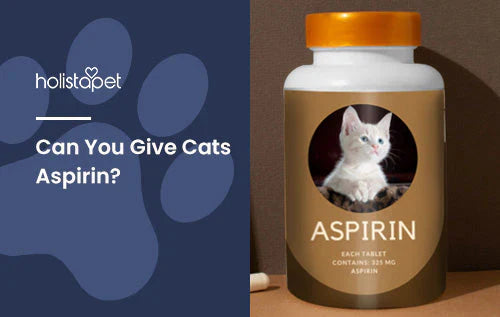Known for their curious nature, cats love exploring everything in their environment - including potential hazards. Medications designed for human use can be especially tempting to our furry friends since they often have a pleasing smell or taste. Aspirin is one such medication that cats may find attractive and may be effective as a handy pain reliever. That begs the question, "Can you give cats aspirin?" or "can cats have aspirin?" The answer is not a simple yes and hinges on several factors that your veterinarian can help you determine.
Although aspirin can help relieve pain and alleviate other conditions your cat may be suffering from, it's essential to know that it can be hazardous for them if given in inappropriate doses. If you're iffy about giving your cat aspirin, you owe it to yourself and your furry friend to keep reading and learn everything there is to know about baby aspirin for cats.
Is Aspirin Safe for Cats?
Can cats take aspirin? We're often asked whether aspirin is safe for cats, and the answer isn't always clear. Although cats are sensitive to aspirin, they can tolerate it if given the appropriate amount. While aspirin has a wide range of uses and can benefit some medical conditions, it also comes with several risks. Whether or not you should give your cat aspirin requires careful consideration and discussion with a licensed veterinarian.
Does Aspirin Have Side Effects for Cats?
Yes, aspirin may have side effects for cats. If there's a side effects, can i give my cat aspirin? Pet parents need extreme caution and close supervision when giving their feline friend a dose of aspirin. Aspirin is a potentially dangerous medication for cats, especially cats with an increased risk of bleeding or cats suffering from bleeding disorders (i.e., clotting disorders). Only use the medication under the guidance of veterinary professionals. If you think your cat may need aspirin, talk to your vet before giving it to them.
The most common side effects of aspirin in cats are:
- Gastrointestinal upset and irritation of the stomach lining
- Vomiting
- Diarrhea
- Decreased appetite
If your cat experiences these side effects after taking aspirin, contact your veterinarian immediately. In rare cases, aspirin can cause more serious side effects such as liver damage or kidney damage.
Other side effects from aspirin may include:
- Stomach ulcers
- Reduced blood clotting
- Blood in vomit or feces
- Reduced blood supply to the kidneys, which, if left untreated, may lead to kidney disease or failure

Why Give Aspirin to Cats?
Aspirin (acetylsalicylic acid) is one of many (NSAIDs) that helps to reduce inflammation and pain. In cats, aspirin is one of many pain medication utilized to help relieve pain from arthritis, injuries, and even surgery. One of the biggest benefits of giving aspirin to cats is that it is much cheaper than other pain medication available on the market.
Additionally, aspirin is easy to find, and many people already have it in their medicine cabinet at home. Another benefit of giving aspirin to cats is that it has relatively few side effects when used correctly. The most common side effect is gastrointestinal upset, including vomiting and diarrhea.
However, this is usually only seen when aspirin is given at high doses or for long periods of time. Although aspirin inhibits pain, it might not be for every cat in need. If you think your cat may be in pain, talk to your veterinarian about whether giving them aspirin is the right choice.
How Much Aspirin Can You Give a Cat?
The recommended single dose of aspirin cats can handle is 6-10mg per kg of body weight. For example, a cat weighing 4 kg (8.8 pounds) would require 24-40mg of aspirin every 12 hours. It's important not to give your cat more than the recommended dose, which could lead to serious side effects. If you're unsure how much aspirin to give your cat, it's best to consult your veterinarian for advice on an appropriate dose.
How Often Can you Give a Cat Aspirin?
You can give a cat aspirin every 48-72 hours. However, it's important to talk to your veterinarian first, as aspirin can have side effects in cats. If you're giving your cat aspirin for pain relief, be sure to closely monitor them and stop if they show any signs of distress or if your cat's pain worsens. Aspirin is best utilized for short-term use. Long-term use can produce irreversible damage to your cat's organs.

How Fast Does Aspirin Work for Cats?
Aspirin can start to work on your cat within 1 -2 hours, though it may take longer for some cats. The effects of aspirin tend to last for around 4-6 hours. If you're giving your cat aspirin for pain relief, you may need to give it more frequently than this (every 4-6 hours). Check with your veterinarian for advice on how often to give your cat aspirin.
Are There Any Natural Alternatives for Aspirin?
Pet owners looking for natural alternatives to aspirin are in luck. Several natural remedies will help reduce your cat's discomfort through holistic means. However, these alternatives are not meant to replace aspirin or any other feline medicine.
Consult your veterinarian to see if these natural alternatives for aspiring are suitable for your cat:
- CBD for Cats: Unlike aspirin, CBD is a naturally derived hemp plant compound not known to cause any adverse side effects in cats, making it a safe option for those seeking an alternative to aspirin. A growing body of evidence suggests that it could be a practical option for those seeking an all-natural discomfort relief for their feline friend. CBD is the go-to option for many pet parents wanting to improve their cat's general wellness.
- Glucosamine Chondroitin: Both glucosamine and chondroitin are combined in a supplemental form. These substances occur naturally in the body and are safe for cats. In addition, they can help to rebuild cartilage and reduce inflammation.
- Curcumin: Turmeric's active ingredient is a safe and effective alternative to aspirin for pain relief in cats. Its anti-inflammatory properties make it an effective pain reliever while protecting the stomach from ulcers. Curcumin is also a powerful antioxidant, helping to protect the body from free radical damage.
- Fish Oil: This oil has anti-inflammatory properties and can help to reduce swelling and pain. It is also rich in omega-3 fatty acids, which are beneficial for your cat's skin and coat health. You can purchase fish oil supplements at most pet stores.
Final Thoughts
Aspirin is generally safe for cats, but it's important to always check with your veterinarian first. If your cat is taking any other medications or has any other health conditions, be sure to inform your vet before giving them aspirin. When giving your cat aspirin, always follow your veterinarian's dosage recommendations. Never give your cat more than the recommended amount, which could lead to serious health complications.
If your cat has any adverse reactions after taking aspirin, such as vomiting or diarrhea, stop giving them the medication and contact your veterinarian immediately. Cat owners wanting to avoid these side effects might want to try CBD or other natural alternatives to help ease their cat's discomfort. Although not a replacement for aspirin, CBD and other holistic remedies will help improve your cat's general wellness and help ease nagging issues that may affect their overall soundness. Don't wait — give your cat the benefits of CBD today with our line of CBD cat products at our Holistapet shop!







![Probiotics For Dogs [Soft Chews] - HolistaPet](http://www.holistapet.com/cdn/shop/files/Probiotic-Infographic-1_472d7a29-e30c-435a-9638-1365d8c3a9f9.jpg?v=1725384841&width=104)



























Leave a comment
All comments are moderated before being published.
This site is protected by hCaptcha and the hCaptcha Privacy Policy and Terms of Service apply.